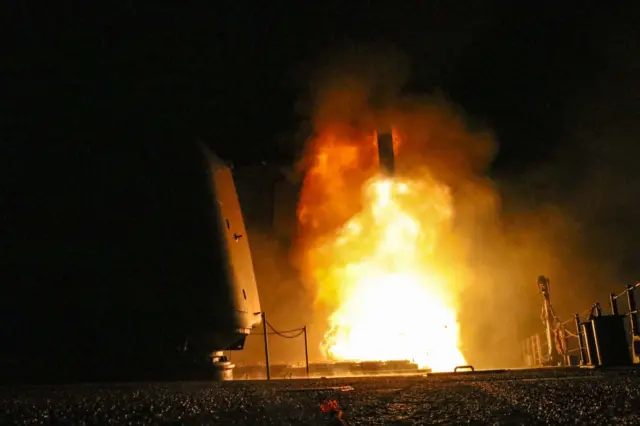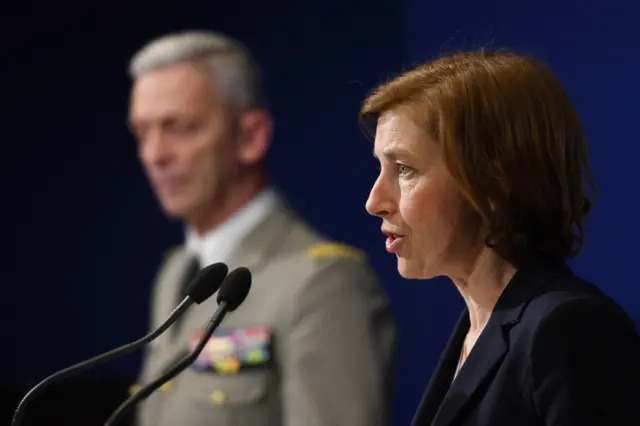UK 'confident' Syria strikes were successfulpublished at 19:17 BST 14 April 2018
PM Theresa May says the co-ordinated attack with the US and France was "right and legal".
Read MoreThe US, UK and France have carried out air and missile strikes in Syria in retaliation for a suspected chemical weapons attack last Saturday
The US says three targets were struck - a research facility in Damascus and storage facilities near Homs
President Trump tweets "Mission Accomplished!"
The Pentagon says President Assad's chemical weapons capability has been set back by years
Russia's President Putin condemns the strikes; another urgent UN Security Council meeting is expected
Russia says missiles were also aimed at other targets but many were intercepted by air defences
Mal Siret and Joseph Lee
PM Theresa May says the co-ordinated attack with the US and France was "right and legal".
Read MoreWe are ending our live coverage of the aftermath of the air strikes that the US, the UK and France launched overnight in Syria.
Here is a summary of what we know:
Thank you for joining us today.
For more of the BBC's comprehensive coverage of the Syria crisis, catch up with our full report, analysis and video explainers:
The Syrian Ambassador to the UN, Bashar al-Jaafari, says the military action that took place overnight will not prevent Syria from achieving its aim of "defeating the terrorists" in the country.
He said the "plan of action" executed by the US, France and the UK was "very strange" and asked those involved to "stop the aggression".
Mr Jaafari also presented three copies of the UN charter outlining its position regarding international law, and urged the US, UK and France to "re-read" it.
He said the "attacks" on Syria, were an attack on the entire UN Security Council.
Theresa May has spoken in separate phone calls to President Trump and President Macron, with the three leaders agreeing that the air strikes had been successful, a Downing St spokesperson said.
"The prime minister welcomed the public support which had been given by fellow world leaders for the strong stand the UK, France and the United States had taken," the spokesperson added.
A statement from the Saudi foreign ministry has backed the US, France and Britain in its air strikes against Syria "because they represent a response to the regime's crimes".
Saudi Arabia has been a key backer of opposition groups fighting President Bashar al-Assad, which Syria says are terrorists.
BBC political editor Laura Kuenssberg says that the UK's publication of its legal advice has not assuaged Labour leader Jeremy Corbyn's concerns.
Allow X content?
This article contains content provided by X. We ask for your permission before anything is loaded, as they may be using cookies and other technologies. You may want to read X’s cookie policy, external and privacy policy, external before accepting. To view this content choose ‘accept and continue’.
She says that the UK is one of only a few countries that use humanitarian intervention as a justification for military action, and that "most international lawyers don't accept it, rightly or wrongly."
The UK Ministry of Defence has said that the four Typhoon fighters flew "in support" of the four Tornado jets which carried out strikes on Syria, according to BBC defence correspondent Jonathan Beale.
The MOD did not confirm the role of the Typhoons, but they can carry air-to-air missiles.
The UK government has released the legal case it says it has for air strikes.
It directly links the strikes to the suspected chemical weapons attack in Douma, which it says "has exacerbated the human suffering". It adds that the continued use of chemical weapons by the Assad regime amounts to "a war crime and a crime against humanity."
It believes it was "highly likely" that chemical weapons would be used again.
It says that the UK has the right under international law to "take measures in order to alleviate overwhelming humanitarian suffering" and that it believes the strikes fulfilled the conditions for permissible humanitarian intervention.
Nato Secretary General Jens Stoltenberg says the organisation "expresses their full support" over last night's military action.
Speaking at a news conference in Brussels, Mr Stoltenberg said Nato "strongly condemns the repeated use of chemical weapons by the Syrian regime" which has chosen to use them "with impunity".
"They cannot become normalised, they are an immediate danger to the Syrian people, and to our collective security and those responsible must be held to account," he said.
US Vice-President Mike Pence says US forces, assisted by France and the UK, have "degraded and crippled" the chemical weapons capabilities of Syria, Reuters news agency reports.
During a meeting with Canadian Prime Minister Justin Trudeau, Mr Pence warned that President Trump was prepared to continue with military operations such as those carried out overnight "if necessary".
Mr Pence also thanked Mr Trudeau for his support of the air strikes.
 Image source, Press Association
Image source, Press AssociationThe US, UK and France say their air forces and navies conducted the overnight strikes on several sites in Syria, firing 105 missiles.
The missiles, says the US, hit targets "associated with the Syrian regime's chemical weapons programme".
So which sites were targeted?
Here's a summary of the locations and facilities that were reportedly struck in the military operation.
 Image source, Getty Images
Image source, Getty ImagesMeanwhile, France's Defence Minster Florence Parly has said that the Syrian regime's capacity to produce and store chemical weapons has been "considerably weakened" following the strikes.
"The mission is a success. The goals had been carefully chosen and I observe that there are no incidents to report between our forces and other forces active in the region," Ms Parly told a news conference.
French army chief Francois Lecointre added that Syria's ground-to-air defence system had been effective but that its efficiency proved "very limited".
Russian assets deployed in Syria were "neither active nor proactive" he said.
France's Ambassador to the UN, François Delattre, says that the suspected chemical attack on Douma called for a "strong response".
"France has absolutely no doubt about the Assad regime's accountability in the chemical attack [in Douma]," he said.
He added that those challenging this should review the facts and information published in a report made available by France, external earlier on Saturday.
Karen Pierce, UN ambassador for the UK, set out four tests for a diplomatic resolution to the Syria crisis:
The UK's Ambassador to the UN, Karen Pierce, said the UK's involvement in the air strikes against Syria was a "humanitarian intervention", which was legally justified.
"The Syrian regime has been killing its own people for seven years," Ms Pierce said, and the use of chemical weapons "was a war crime and a crime against humanity".
Ms Haley adds that the US would not allow the Assad regime to continue to use chemical weapons for "mass murder".
"Russia's veto was used as a green light for Assad to use chemical weapons.
"Our Syrian strategy has not changed. However Syria has forced us to take action by it use of chemical weapons," she said.
"The US is locked and loaded," she added
US Ambassador to the UN Nikki Haley responded that Russia was carrying out a "disinformation campaign".
But she said that the victims of chemical weapons attacks in Douma were not "fake news".
"We gave diplomacy chance after chance," she said. But Russia had blocked action on Syria's chemical weapons six times in the UN security council.
"We cannot stand by as Russia trashes every international norm that we stand for," Ms Haley said.
Vassily Nebenzia adds that Russia "condemns in the strongest possible terms" the military action in Syria.
"The US panders to the terrorists and the current situation is destructive," he said.
"The US and its allies continue to demonstrate blatant disregard for international law."
He said it was "shameful that the US constitution was cited as a reason to launch military action.
"It's interesting what the UK and France will think when they realise they have broken international law while citing the US constitution."
Mr Guterres says events in Syria demand a political solution.
"There is no military solution to the crisis, the solution must be political", he says.
"We must accelerate the political process."
Mr Guterres emphasised the need for member states to act consistently with the UN charter and in accordance with international law".
"I urge member states to avoid actions that could add to the suffering of the Syrian people ... for eight long years the Syrian people have lived through a series of horrors."
Earlier in the session, UN Secretary General António Guterres urged members to exercise restraint and "avoid escalation".
He said that he was disappointed that the security council had "failed to agree an effective mechanism against the use of chemical weapons in Syria."
"I urge members to fulfil their obligations," he said.
Mr Guterres said the situation in Syria called for a "thorough investigation", and said the Organisation for the Prohibition of Chemical Weapons team was ready to investigate the site Douma.